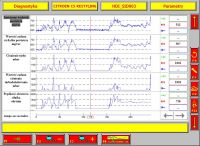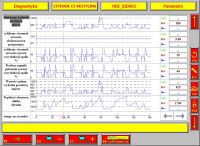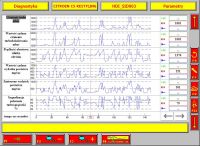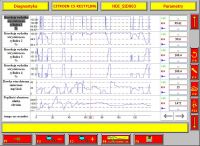Hello, Patient Citroen C5 2.0 HDI 136 horses, RHR engine. There is a problem with the car that it jerks unevenly when driving gently, more maintaining speed in the 1200-2000 rpm range, above that this effect disappears. The car is after delicate mechanical transitions, there have been several repairs here they are:
-repaired turbocharger, a new coras was put in, only the shells were left, made by a company from Stalowa Wola.
-The entire intake system was cleaned, as the turbo had leaked oil.
-The catalytic converters and FAP were cleaned as far as possible, because the oil had been carried out of the turbo through the exhaust.
-Removed a lubrication defect in the turbo (hence its damage - worn out shaft completely).
And now, we're driving, we're at 40kmh, the revs are around 1500rpm and you can feel this kind of gentle jerking, like there's no power at these moments.
What has been done:
-replacement of the flow meter, for a second working one, no change
-replacement of EGR with another functioning one, also no change
-replacement of EGR, and the same thing happened, also jerking
Only disconnecting the EGR (plug) gives a 100% improvement and no jerking, likewise disconnecting the flow meter no jerking, even with the EGR plugged in. What is the problem?
The lexia shows no errors, parameters within norms, I did logs yesterday of course, I have snapshots, I'll insert soon.
I did an overflow test, counting the injectors one by one from the timing side, it 1 poured 19ml, 2,3,4 16ml.
For now I will say, I don't like the injector corrections at idle:
1 101.3%
2 96%
3 102%
4 105%
While driving 103.9% all.
I added 100ml of 2T oil to the fuel, the corrections improved slightly, i.e. the 4th injector dropped to 102%, the 2nd fluctuated unchanged for a total of greater....
I would ask for help as I am already outgrowing the car. Personally I suspect a damaged FAP due to oil that has pushed through to the end of the exhaust. It's slightly pushed I believe. I'll post logs of what the airflow, turbo control and EGR looks like before long. Thanks.
With the EGR unplugged: flow from the airflow as well as from the turbo identical
 .
.
With the EGR added below: slight ripple, marked jerk at 34th second. You can see such a tooth...


 .
.
-repaired turbocharger, a new coras was put in, only the shells were left, made by a company from Stalowa Wola.
-The entire intake system was cleaned, as the turbo had leaked oil.
-The catalytic converters and FAP were cleaned as far as possible, because the oil had been carried out of the turbo through the exhaust.
-Removed a lubrication defect in the turbo (hence its damage - worn out shaft completely).
And now, we're driving, we're at 40kmh, the revs are around 1500rpm and you can feel this kind of gentle jerking, like there's no power at these moments.
What has been done:
-replacement of the flow meter, for a second working one, no change
-replacement of EGR with another functioning one, also no change
-replacement of EGR, and the same thing happened, also jerking
Only disconnecting the EGR (plug) gives a 100% improvement and no jerking, likewise disconnecting the flow meter no jerking, even with the EGR plugged in. What is the problem?
The lexia shows no errors, parameters within norms, I did logs yesterday of course, I have snapshots, I'll insert soon.
I did an overflow test, counting the injectors one by one from the timing side, it 1 poured 19ml, 2,3,4 16ml.
For now I will say, I don't like the injector corrections at idle:
1 101.3%
2 96%
3 102%
4 105%
While driving 103.9% all.
I added 100ml of 2T oil to the fuel, the corrections improved slightly, i.e. the 4th injector dropped to 102%, the 2nd fluctuated unchanged for a total of greater....
I would ask for help as I am already outgrowing the car. Personally I suspect a damaged FAP due to oil that has pushed through to the end of the exhaust. It's slightly pushed I believe. I'll post logs of what the airflow, turbo control and EGR looks like before long. Thanks.
With the EGR unplugged: flow from the airflow as well as from the turbo identical
 .
.
With the EGR added below: slight ripple, marked jerk at 34th second. You can see such a tooth...


 .
.


